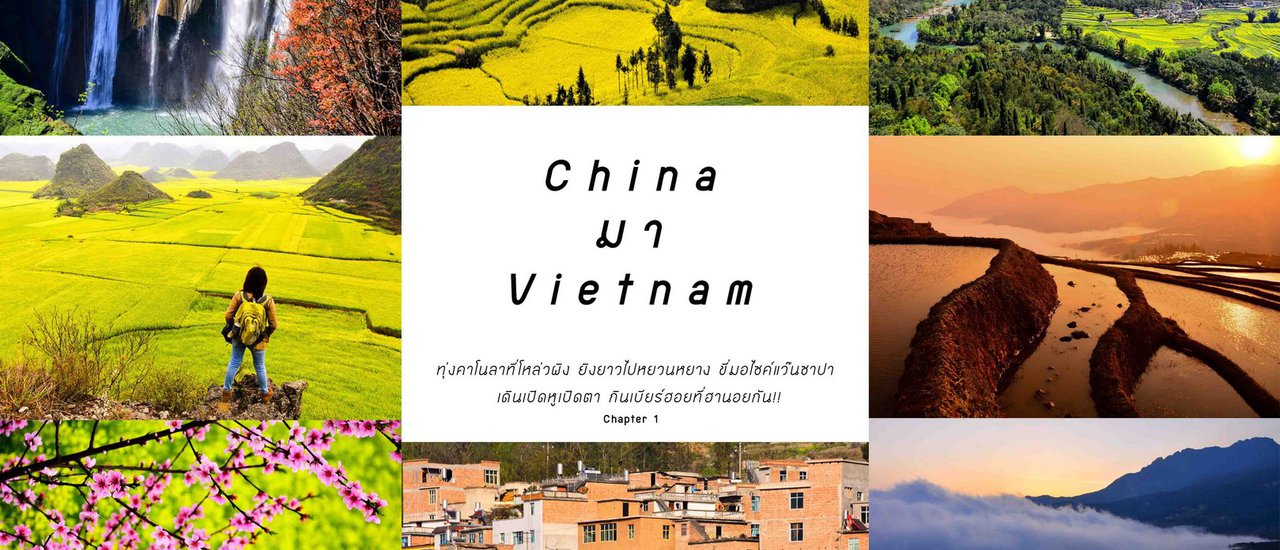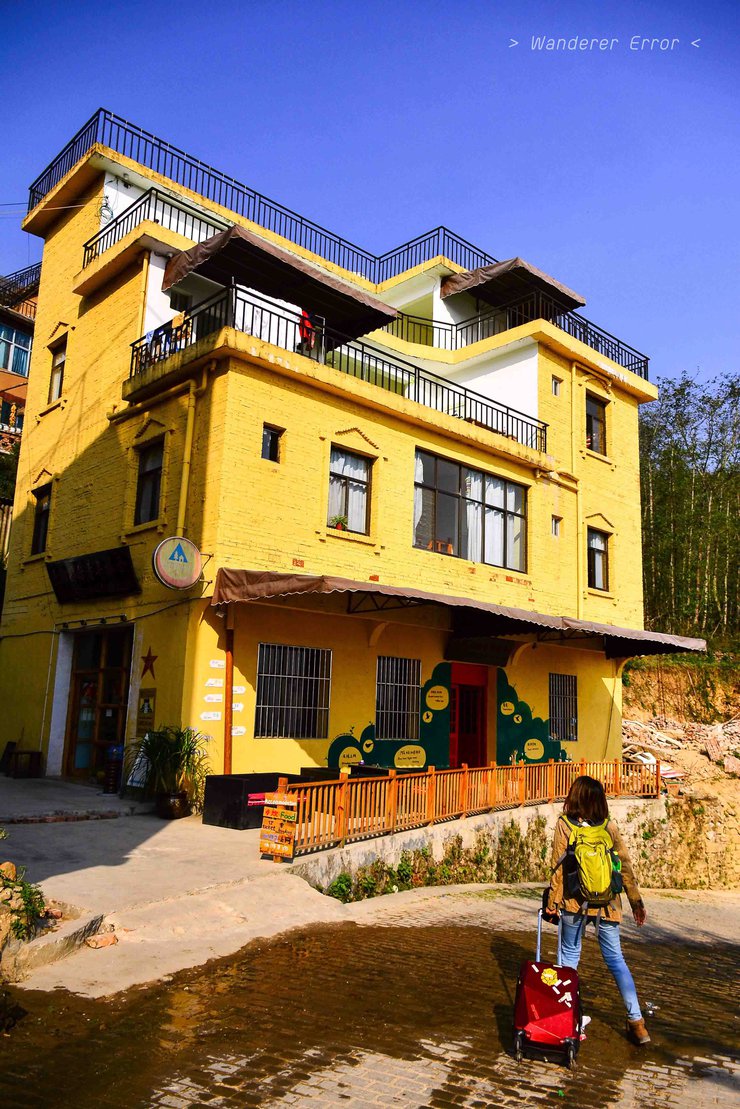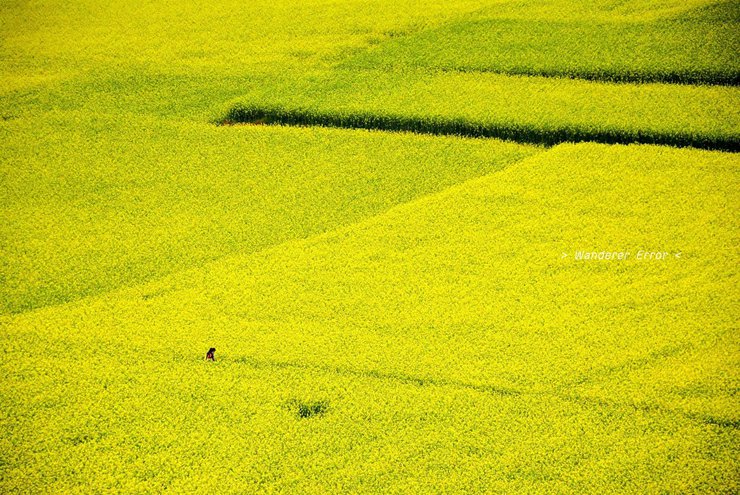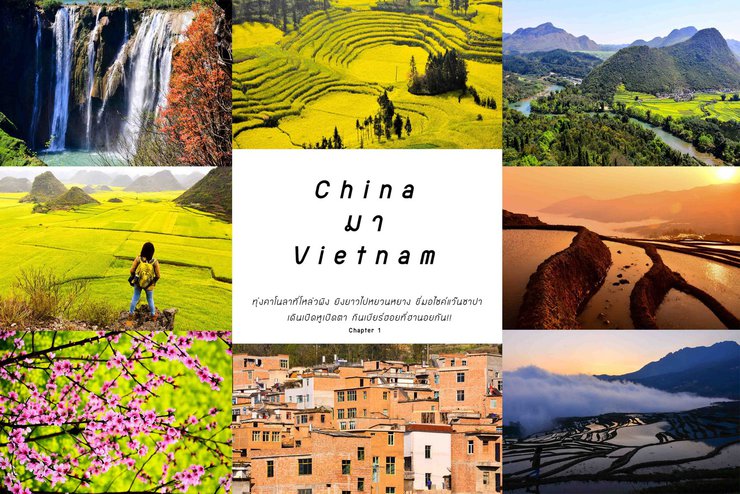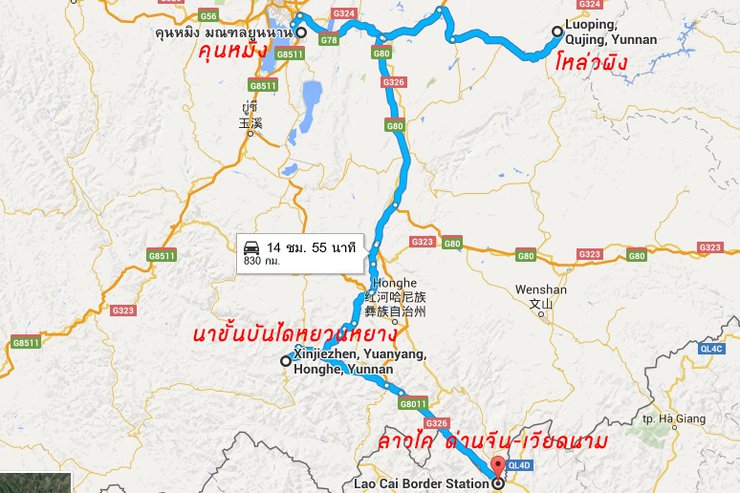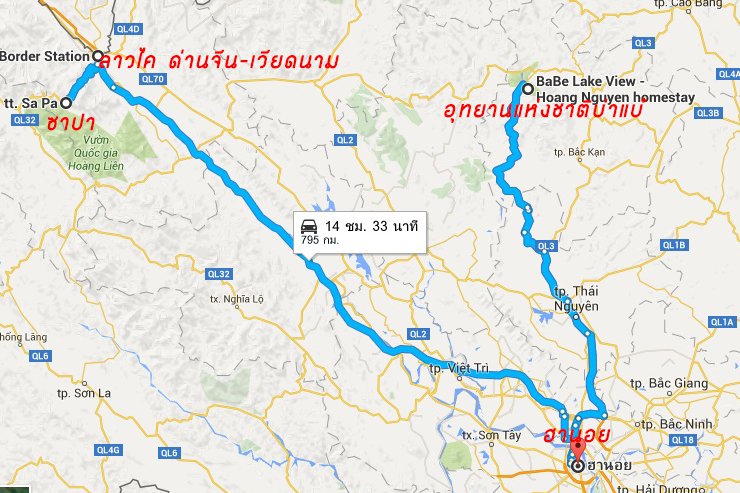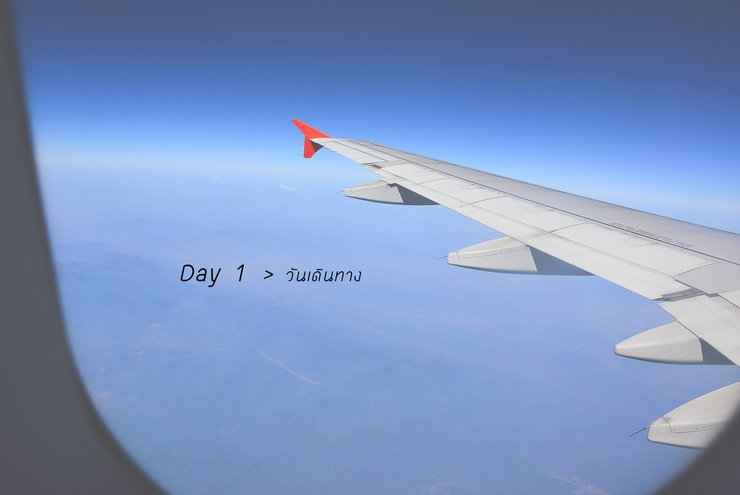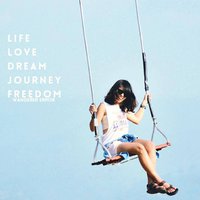

Hello.
Hwang Noi returns after a long hiatus from posting travel content.
It's time to reminisce a bit. I'll write as I remember, even if it's a bit hazy or incomplete.
As usual, we went as a couple. It wasn't because we wanted to be alone, but because we didn't have anyone else to go with.
After a short deliberation on where to go this month,
In summary, we visited the Canola fields in Luoping, took a long drive to Yuanyang, rode motorbikes in Sapa, and enjoyed beers in Hanoi.

Why is it Louping?
The Chinese visa allows for re-entry, and the canola fields in Luoping will be in full bloom in March.
Why go to Yuanyang? Well, it's close by, and it's famous for its beautiful terraced rice fields.
Why would you go to China and still want to visit Northern Vietnam?
Oh, Yuan Yang and Vietnam are so close, how could you miss it?
Not only is it close to home, but it's also easy to get to, and the cost of living isn't that different. So, what are you waiting for? Let's go!
Travel Plan March 5-15, 15 (This is before I go, I haven't fixed anything yet, after I come back, it will be like this)
Day 1: (5) Bangkok - Kunming - Luoping Day 2: (6) Luoping Day 3: (7) Luoping - Kunming - Yuanyang (overnight bus) Day 4: (8) Yuanyang Day 5: (9) Yuanyang Day 6: (10) Yuanyang - Lao Cai (Vietnam Border) - Sapa Day 7: (11) Sapa - Hanoi Day 8: (12) Hanoi - Ba Be National Park Day 9: (13) Ba Be - Hanoi Day 10: (14) Hanoi - Free Day Day 11: (15) Hanoi - Bangkok

Preparation:
- Money: Essential! We exchanged some money into Yuan, and will exchange the remaining amount into Vietnamese Dong at the Lao Cai border.
- Visa: You can apply for a Chinese visa through an agent or directly. Vietnamese visa is not required for Thai citizens.
- Documents: Copies of visa, passport, and flight ticket. We had some hotels in mind but didn't book in advance.
- Clothing and Equipment: We packed light to avoid carrying heavy luggage, especially since we knew we'd be using various modes of transportation (more on that later).
- Language: Luckily, my partner can communicate in basic Chinese and Vietnamese. If you don't speak the languages, I recommend writing down the names of places and some simple vocabulary in Chinese. Even if you can't read the characters, you can compare them to the actual signs. Additionally, there are many mobile apps that can translate languages easily. Try them out!
In addition, English signs are becoming increasingly common in Chinese cities, with the exception of rural areas where Chinese remains the primary language.
At tourist destinations like Yuanyang, some Chinese people can speak English.

**Travel**
First, let's consider how to get there. There are two ways to travel from Thailand to Kunming, the starting point.
1. Route by car:
Bangkok - Chiang Khong - Luang Namtha - Kunming
Departing Bangkok in the evening, you will arrive in Chiang Khong early the next morning. Cross the border into Laos and ask for a direct car at the checkpoint to take you to the Kunming bus station, which is not far away.
The cost of the bus is less than 100 baht. It crosses the border between Laos and China, with a stop for lunch. The bus is a sleeper bus, clean and comfortable. The price is around 320 yuan (as of 2013). The bus stops in Mengla, where you can transfer to Jinghong or Sibsongbanna. From there, you can continue to Kunming, arriving in the morning.
This translates to:
This equates to a total travel time of 2 nights and 1 full day.
Travel to the South Bus Station and take a taxi to the East Bus Station (similar to our Southern and Northern Bus Stations, but there are multiple stations here). To find out which station to go to for your desired city, check the following link:
http://www.travelchinaguide.com/cityguides/yunnan/kunming/travel-tips2.htm
We once took a car from Thailand to Shangri-La four years ago, intending to reach Deqin, but we didn't make it.
Due to time constraints, we only reached Zhongdian before returning to Thailand by the same route. (This trip opened my eyes to the experience of cross-border travel, which I will never forget. I wrote a record of it, but as usual, I left it unfinished.)
2. By plane
This trip, I chose to fly because we planned to travel across the city by car once we arrived. I wanted to save some travel time. I used AirAsia, and thanks to a generous sponsorship from Trip Magazine, I didn't have to pay for the flight myself. I would like to express my gratitude publicly.
Read Part 2 > Day 7-11 China to Vietnam | Chapter 2 "Ba Be" - A familiar tourist destination that wins the hearts of nature and peace lovers.
Note:

Day 1: Bangkok - Kunming - Luoping
From Bangkok to Kunming, it takes a short journey to reach the southern part of the Dragon's Land, with Kunming as the capital of Yunnan Province.
Upon arrival, look for the subway sign. At the entrance, there will be an automatic coin machine with an English menu (amazing, right?).
The machine only accepts banknotes up to 50 yuan. Smaller denominations can be obtained at the nearby customer service counter.
Our first destination is Luoping, and we need to take a bus from the East Bus Station.

5 yuan for the fare, inside the new and very clean booth, most importantly, there is a clear English display. It only took us 25 minutes to arrive.
China is undergoing significant transformations. Infrastructure improvements, such as better roads, have made backpacking a less arduous experience compared to the past. While the reasons for this improvement are multifaceted, including advancements in sanitation, transportation, and social infrastructure, it is worth noting that China, along with India, has historically presented challenges for backpackers due to various factors.
Upon arrival, you will find numerous ticket booths lined up. You can enter any open booth.
Simply tell us your destination and we'll take care of the rest.
The East Bus Station offers free Wi-Fi, making the two-hour wait for the bus a breeze. You can surf the net while you wait.
The bathroom wasn't terrible, except for the near-miss with a pile of excrement in the middle of the walkway. To this day, I'm baffled as to how it ended up there.

- While the car was parked, when he realized we were taking his picture, he turned to face the camera. The uncle is so cute!
The weather today is pleasant, with the sky still overcast by fog and clouds (or maybe smoke, haha).
The journey was smooth, except that the English signs that once captivated my heart have now vanished.

The train departed from the platform on time, as indicated on the ticket. The interior was brand new, and the road was smooth. In less than four hours, we arrived at our destination.
However, Luoping City is not the final destination for the canola fields. You need to take another car ride to get there.
At that time, I remember that there were both green buses and minibuses that could take you to the city of Jinjiling, which was not far away. The fare was 7 yuan per person.
Upon arrival, it was already pitch black. We deliberately chose our accommodation based on its location.
After asking around for a while, I found a place for 50 yuan a night. The price, cleanliness, and location were all acceptable, so I made a quick decision. The only downside was that it was a shared bathroom, but I didn't mind. I was just looking for something cheap. 555
We stayed for two nights in a hotel near the entrance to the Jinji Temple, which also boasts a popular viewpoint at the top.
Accommodation options in this area may not be of the highest quality. If you are looking for a comfortable stay in a 4-star hotel, it is recommended to choose accommodation in the city center of Loei.
For dinner, we ate at the hotel restaurant. We tried the stir-fried vegetables with canola, which wasn't bad, but we couldn't finish it (hmm, what's up with that?). We don't usually eat vegetables anyway, and they were a bit smelly and green.
The first day has passed. Tonight the weather is quite cool. Tomorrow will probably be the same.

Day 2: Luoping - Jiulong Waterfall
Dawn of the 2nd, awakened with hope.
After getting dressed and washing their faces, they braved the darkness and cold to head towards the Jinji Temple, accompanied by a large group of Chinese friends who were also heading in the same direction.
The entrance fee to watch the sunrise is 20 yuan per person. It takes about 20 minutes to walk up the stairs in the dark.
We have arrived at the best viewpoint in Jinjiling City, but it is only about an hour before sunrise.
Believe it or not, there are still many large groups of Chinese tourists who have arrived early.
Having found a promising location, they set up their camera and waited patiently for the first light to break through the cold.

- This has already gone down a bit. -
But as it started to get lighter, we were stunned!!
Where are the canola fields bathed in the golden light of dawn, as beautiful as we saw in the Chinese tourism posters?
The fog is so thick that it is impossible to see the view. All you can see are the heads of people, which are surprisingly numerous given the poor visibility.
We waited and waited, until almost 9 o'clock.
Defeated by the fog, we couldn't see anything. It was pointless to stay up there, so we decided to go down and take pictures instead. We ended up wasting 20 yuan each.

After descending from the mountain, we weaved through the canola fields below, taking in the sights up close.
This area offers both bicycle rentals and charmingly decorated buffalo and ox carts adorned with colorful bows. (Yes, there are real buffalo!)
It's like riding a cart through the fields.

Some plots cost money, some are free, and there are even balloons.
However, the balloon was a bit scary. It went up a little and then flattened out.
As I walked down and looked out over the hill in the middle of the yellow field, I noticed that in addition to the viewpoint on Jinji Temple,
Enterprising merchants have also set up viewing points on small hills, allowing tourists to enjoy panoramic views of the fields from above.
The bustling crowd below suggests that this place is also quite crowded. We did not inquire about the price here.
However, after searching for a hill that we could climb on our own, we found one that was very private. The top was quite narrow and there wasn't much flat ground to stand on, but the beautiful view made up for it.

After taking photos to your heart's content, prepare to take a taxi to Jiulong Waterfall, also known as Jiulong Waterfall. Local taxis are available nearby.
Each person paid 10 yuan to play with the driver's children while waiting. Soon, the car was full.

Jiu Long Waterfall is located near Jinjiling Town, only 10 kilometers away. It is one of the nine most beautiful waterfalls in China.
The entrance fee was 75 yuan per person, but since my husband had been there before, I went in alone.
I'm not sure what you mean. Can you please rephrase your question?
Going alone wouldn't be a problem, but she threatened that I had to climb to the viewpoint at the top and come back on time. That's the difficult part.

Initially, we strolled and took pictures while enjoying the scenery. Later, we realized that the viewpoint required a significant climb, which we hadn't anticipated. Additionally, the area was quite extensive. We shouldn't have wasted time in the beginning.
As you approach the waterfall, its beauty and grandeur become even more apparent. However, if you prefer not to walk, there is a cable car available.

- Warning: Do not take selfies while standing on this rock. See the red thing on the right? That's it. -

The afternoon sky cleared, the sun blazed, and on the way back from the waterfall, the sunlight and the sky were so tempting that I couldn't help but go back to watch the sunset at Jinji Temple.
As they started to walk back up the hill, the old lady who collected the entrance fee, who had been previously unseen, emerged from the shadows beneath a tree.
Dialogue translated by a passerby:
Auntie: "20 yuan.."
Man: Shows the ticket from earlier in the morning.
Auntie: Waves her hand dismissively. "No, no, that was this morning."
Man: Stunned. "Auntie, come on, it wasn't visible this morning, you saw it too." (This sentence was accompanied by hand gestures.)
Auntie: "No, no." This time, she crossed her arms and frowned, but thankfully, she didn't show her fangs.
"Asked if I would agree, of course I would. I wanted to see it, so I agreed to pay."
While we were negotiating, a young Chinese man joined in. I gave in, but the young man didn't.
The area above is part of the temple grounds. I understand that previously there was no entrance fee, but now there is a significant charge of 20 yuan, which is equivalent to 100 baht per person.

The scorching sun, which had been blazing fiercely, began to soften its glare as clouds rolled in, casting a veil over the sky.
The view was breathtaking, with vast fields of canola stretching as far as the eye could see, unlike anything I had ever witnessed before.
If someone told me this was the biggest in the world, I would believe them. It's truly the best.

- The first shot shows a camera trick, the second shot shows 3.

The air above was colder and windier than below. Although we didn't see the last light, we felt that the sky was starting to get cloudy, so we went down to walk around and take pictures in the city.
The countryside atmosphere is great. People are friendly and don't seem as prone to deception as those in big cities (maybe? haha). I'm starting to feel like I brought too few warm clothes. >"<

Day 3: Luoping - Snail Farm - Kunming - Yuanyang (Overnight Bus)
In the morning, I had some time to take a few more photos. I came across a row of white plum blossoms hidden in a field of canola flowers that were just starting to bloom.
Before heading back to Loping, I intended to buy a bus ticket back to Kunming, specifically choosing an afternoon bus.
To have time to visit another unmissable canola field.

Reassured that he had secured a bus ticket, he hailed a taxi and negotiated a fare to take him to Snail Farm, a distance from the bus station. This precaution was taken to avoid potential overcharging by unscrupulous taxi drivers.
Round-trip price is 100 yuan.
Snail farm is another beautiful canola field. When viewed from above, the field plots look like overlapping circles, resembling a snail's shell, hence the name.

Our taxi driver was a woman, a large and somewhat boisterous figure. She was kind, however, and stopped wherever we needed, never rushing us.
However, it didn't take long to take photos, as we wanted to spend the remaining time before the train departed exploring the city.


Luoping, a small town not far from Kunming, was originally a town where people made a living by growing this type of peach.
Before the plant produces seeds and pods that can be extracted for oil, it blooms with vibrant yellow flowers that stretch across hundreds of acres, creating a breathtaking spectacle that is a feast for the eyes.

The period from late February to early March, when the flowers bloom only once a year and for no more than two weeks, is filled with tourists from all over the world. As a result, local residents have suspended their agricultural activities and turned to tourism during this short season.
Note: As there is no text provided for translation, I am unable to complete this request. Please provide the text you would like me to translate from Thai to English.

- They were playing cards at a big event, a very serious event. -
The inner city is relatively developed, with a larger population than the surrounding villages.
Despite the language barrier, the warmth and kindness of the people were evident in their smiles and eyes.
A bakery owner in the market, upon learning that we were Thai, struck up a conversation, sharing that they had visited Thailand and loved it.
We didn't really understand each other, but I laughed it off and agreed with him. He ended up giving me some extra snacks as a bonus.

While exploring the city, we weren't exactly walking empty-handed. We were dragging our luggage along with us (haha). But it wasn't heavy, just two 24-inch suitcases and a daypack each.
Luohu Railway Station is not large, so you don't need to allow much time. After passing through the security check, you will be directly at the platform.
However, when we arrived, the bus terminated at the East Bus Station. Our next destination was the South Bus Station, which heads to Yuan Yang, so we had to transfer to another bus.
Upon disembarking, I looked for the queue for the connecting train, which conveniently served all stations. Clear signage made it easy to find.
...However, it turned out to be only in Chinese, which made me cry a lot.
Fortunately, the groom can ask around. If not, jot down some keywords, such as north, south, east, west, or the name of the place we're going.
The price is only 5 yuan per person, but it is very crowded. It is almost impossible to ride a horse. It is a good thing that I got on the horse early, otherwise I would not be able to sit.

I had to run to the station to catch the train.
The task was divided into two roles: the groom ran empty-handed to join the queue to buy tickets, while I acted as the laborer due to my lack of language skills. I carried all our belongings through the X-ray channel with all my strength, following him to the ticket booth.
"Got the ticket, but hurry! The train is about to leave!!"
The sound of the whistle blew, and I ran without hesitation. I barely caught the last bus, famished and without having used the restroom. All I had eaten that day were snacks.
Despite snacking, I'm quite full. I had several pieces of paprika-dusted fried chicken. Hehe.
The sleeper bus to Yuan Yang costs 139 yuan. The sleeper car is quite comfortable and spacious.
Upon entering, we were required to remove our shoes and place them in plastic bags provided to prevent dirt from being tracked onto the vehicle. We secured the front row seats.
Initially, I was relieved that I wouldn't have to endure the pungent odor of the crowd's feet. However, to my dismay, the culprit was the individual sleeping directly above me!
Despite the overwhelming stench, I had no choice but to endure it. I resorted to my secret weapon, a potent inhalant, which I held to my nostrils until the burning sensation numbed my senses. Gradually, I became accustomed to the foul odor.
As the car slowly carried us towards the road leading out of the city…
The thought crossed my mind: when did I become so enamored with the feeling of riding in a car, especially when sharing a sleeper car with strangers?
The anticipation was palpable, a mixture of excitement and trepidation. As they embarked on their journey through the darkness, they couldn't help but wonder what awaited them at their destination.
Occasionally, one finds good travel companions, enjoying the cool air conditioning on the bus.
… or perhaps having to sleep with their noses covered due to the dust swirling around the car.
... or perhaps unable to sleep when encountering a driver with a lead foot.
I realized I had fallen asleep without realizing it. Before I dozed off, I was worried that if we arrived early before sunrise, we would have to wait at the bus stop. But no, I woke up at 2 am to find that the driver had stopped the bus for us to sleep. However, I couldn't fall asleep again, so I had to pull out my phone and listen to music with my headphones.
The car continued its journey until dawn, arriving in Xinjia City just as the morning sun rose.

Day 4: Hiking the Yuanyang - Qingkou Village Route (8)
Arriving early in the morning, we found a car to take us to the park to sleep. We chose to sleep near the DuoYiShu table.
The 15 yuan bus ride was packed with Hani people, a local ethnic group.
A young child walks to school, bright and cheerful, passing by houses.
Upon reaching the Isuzu table, we started looking for accommodation. It turned out to be full.
Some places that were still available were expensive, so I tried calling one place that someone on Pantip had reviewed (thank you so much! It's a good thing I wrote down the number).
The entrance to the village of Pugaolao is hidden and slopes downwards.
This zone offers the advantage of being close to the rice terraces viewpoint, allowing for a more intimate experience without the crowds. Additionally, it provides a peaceful and serene atmosphere.
... but it has to go up and down the hill, oh no...

Our accommodation for 2 nights is Timeless Hostel, which is affordable and clean.
The owner, a kind-hearted young Chinese man beneath his indifferent facade, must have been very tired.
I understand that you are short-staffed at the moment, so you have to do everything yourself. I can see that you are not smiling much, but you are still very helpful in providing tourist information.
Moreover, they generously offered us a 4-bed dorm room with an ensuite bathroom for only 40 yuan per person, even though it was unoccupied.
This translates to:
"This means that it's like having a private room, which is different from some places where they might put you in a shared room if it's not full, instead of opening an empty room."
However, the downside is that if you eat here, you will have to wait a long time, and if the chef is not available, the owner can only make simple dishes.

In addition to the nearby Jackie Guesthouse, Berlinda, and youth hostel,
However, Jackie seems to be popular, as two or three groups of Western tourists I spoke with were staying there.
On another day, while we were having lunch and taking a car back to our accommodation, we happened to be in the same car with a Korean person who was almost overcharged by the people in the room above.
The driver and the hotel insisted on the guest staying at the current location, despite the guest's request for transportation to Jackie.
However, Jackie was fully booked, so we invited him to stay with us.
The Korean guy came solo to travel in China from some city. He can speak a little English but no Chinese. He made it here, so I give him a thumbs up.
However, for those with limited time, it is recommended to stay in Xinjie. This is due to its convenient access to and from Yuanmou, as well as its lower hotel prices. Additionally, finding food options is easier in Xinjie.
After a refreshing nap and a relaxing shower, it's time to embark on a tour of the magnificent terraced rice fields.

Yuanyang Rice Terraces, a masterpiece of the Red River Delta farmers, sculpted by the power of water.
Spanning a vast expanse, the ancient city, dating back over 1300 years, gradually descends along the mountain slopes.
The world's largest and most magnificent coral reef, which was designated a UNESCO World Heritage Site in 2013 for its environmental significance.
This mountainous region, ranging from 1300 to 1600 meters in elevation, is home to a diverse population of indigenous tribes, with the Hani people constituting the majority, accounting for 95% of the area's inhabitants.
It is also one of the cities that the Chinese government has allowed to govern itself.

Yuan Yang is renowned for its stunning rice terraces, each boasting unique beauty.
As the sun rises, its rays hit the water's surface, reflecting a dazzling golden hue.
Or during sunset, it will be reflected in gray.
The reflection of light and sky on the surface of the rice fields varies depending on the occasion.
And as the fame of these rice terraces spread far and wide, they became increasingly well-known.
This expansion caters to the growing number of tourists, offering a more convenient travel experience than ever before.

Visitors must purchase tickets to enter all four viewpoints according to the platform designated by the park.
100 yuan per person, limited to one entry per viewpoint within 3 days. Tickets can be purchased at any point.
1. JingKou is suitable for the morning.
2.Bada can be enjoyed at any time.
3. DuoYiShu Sunrise Viewpoint
4. Tiger Mouth Sunset Viewpoint (LaoHuZhui)

As we wouldn't make it to Tiger Mouth in time for the sunset, we opted to purchase tickets and explore other attractions instead.
Before leaving, we asked the hotel to help us find someone to share the cost of a full-day car rental for tomorrow.
Following the hotel owner's recommendation, we embarked on a invigorating hike to Cinque Terre.

From the scenic viewpoint, we descend along the path towards the villages of Dapa and Singkow, where we can experience the terraced rice fields up close.
Without the need to compete with anyone, allowing for a peaceful and undisturbed experience.
Seeking breathtaking sunset viewpoints from the highest to the lowest.
However, the more I searched, the more tired I became, as if I were walking in circles in a small alley in a village. So I gave up and walked back up to the top again.
Encountered a few Chinese and Western tourists.

It was fine coming here in the afternoon, but I forgot to think about how to get back.
From here to the main road is several kilometers, and there are no vans or taxis passing by. So I had to hitch a ride with some Australian girls who were driving out.
It was almost 8 pm by the time I got back to my accommodation because I stopped for dinner, and the later it got, the harder it was to find a ride.
The owner informed that they have found a car and people to share with, at a cost of 184 yuan per person. This price is to be shared among 4 people. Do you agree?
(This price was previously recorded. I'm not sure why it seems so expensive. Maybe I made a mistake. Haha. But I think it's expensive because there are few people to divide it among.)
I met the Chinese uncle and aunt from Beijing who will be joining our trip tomorrow. They both seem very lovely.
Relieved to not be an old woman. 555
Tomorrow will be fun for sure.

Day 5:
- Sunrise at DuoYiShu: Witness the breathtaking sunrise over the stunning rice terraces of DuoYiShu.
- Ayi Chun - Da Wa Chun: Explore the picturesque villages of Ayi Chun and Da Wa Chun, known for their traditional Hani mushroom-shaped houses.
- MaLiZhai: Immerse yourself in the authentic Hani culture at MaLiZhai, a traditional village with unique architecture and customs.
- Red River at LongShuBa: Marvel at the vibrant red hues of the LongShuBa River, a natural wonder.
- Sunset at LaoHuZhui (Tiger Mouth): Capture the mesmerizing sunset at LaoHuZhui, a scenic spot with breathtaking views.
After a good night's sleep, we headed to the Toh I Shu viewpoint to watch the sunrise. Don't forget to bring your tickets with you.
This morning's sunrise was a nerve-wracking experience that shattered any previous idyllic images of a peaceful sunrise.

The platform was packed with people at all levels. It seems that everyone set up their tripods as early as 4 am.
We arrived just as the light came, trying to find a way to take pictures on the edge for a moment, being pushed around there.
I could only watch the situation unfold. If only I had followed him down to the rice paddy below.

After a small-scale territorial war, they returned to the hotel for breakfast.
Unable to recall the exact appointment time, which was likely around 9:00 AM, our group of four boarded the pre-arranged vehicle.
The driver was incredibly kind and polite, which was the last thing I expected when traveling in China. I never thought I would encounter such a pleasant experience.
It is likely that the accommodation has a good relationship with the drivers and has used their services before, so they know how to take care of tourists.
My fellow travelers were both lovely, even though I (myself, alone) couldn't understand a word they said.
The elderly couple smiled warmly and chatted happily, taking good care of each other. They even shared their fruit with me.

The best time to admire the rice terraces is during the morning and evening.
The first place we visited was Ai Chun, a rice paddy filled with a sea of mist. However, it was very crowded, so we didn't stay long.
While taking photos from above, an aunt was posing like a model on the ridge of a rice field. She fell down and got half of her body covered in mud.
Both funny and pitiful, I dare not laugh too much because I intend to walk the paddy field tomorrow as well. Karma might catch up with me.
Upon seeing that we were short on time, the driver took us to another location that was equally beautiful but required a short hike to reach.
There weren't many people when I arrived, and the view was the same as Ai Chun's. This place is called Da Hua Chun.
And then continue to the mushroom-shaped village in the style of the Hani people. Each house has a clear UNESCO house number sign.

An old man sat and lay guarding the house, while a mischievous child ran around playfully.
At lunchtime, the driver took us back to the hotel, where we had lunch and then met up again in the afternoon.
The afternoon was almost boring after leaving the remaining viewpoints. Fortunately, the driver took us to a Hani people's feast that was happening during our visit.

The village was closed for a large-scale pig and chicken slaughter event. There was an abundance of food, drinks, and alcohol, which were constantly replenished.
The elderly couple dispersed to take photos, while I happened to make eye contact with an uncle who was sitting and eating nearby.
"He saw that we were curious, so he invited us to sit down and eat with him. We didn't dare to refuse (really?)."

The local cuisine was a delightful experience, offering authentic flavors that were both unique and intriguing. The rich, fatty pork, pickled vegetables, and potent distilled liquor created a symphony of tastes that were both familiar and exotic.
If it weren't for the fact that my uncle and aunt were waiting, we would have gotten completely drunk right there. We had to eat and leave quickly, which was a shame. 555

To conclude the day's program, we watched the sunset. However, we couldn't stay long because the sky was very hazy and there were a lot of people.
After taking photos as evidence of their visit, they sat down to eat "stinky tofu" with liquor, waiting for the old uncle and aunt in front.
Do you know what the corn kernels are used for by the vendors?
To keep track of what each person has eaten and how much.
Cute, right? I didn't know at first, but someone told me later. Haha.

Before we parted ways, we offered the driver a tip, but he refused. He thought it was the fare.
The situation escalated, with loud voices demanding payment at the hotel. When a Chinese passerby who spoke English intervened and explained the situation to the man, he immediately became cheerful.
I encountered another charming Chinese person.
But the next day, it was like a completely different movie.

Day 6: Yuanyang - Lao Cai (Vietnam Border) - Sapa
Bidding farewell to Yuan Yang, we embarked on a final adventure, capturing the breathtaking sunrise amidst a sea of mist.
Walking along the paddy field bunds from dusk onwards, without being disturbed by the villagers or having to jostle with anyone else.

This morning is absolutely amazing. The scene before me is the light gradually pouring down, hitting the still water that is trapped in the rice field, reflecting like a shadow according to the movement of the sea of fog.
Villagers carrying baskets on their backs, walking on the ridge of the rice field, is a beautiful sight, worth seeing.

As I look back at the platform from where I stand, I see a sea of black heads crammed together. I can't help but feel a little smug knowing that I have the entire view to myself.

The time for revelry, however, is often limited. It is time to bid farewell in earnest.
After checking out, I hailed a car to Sin Chia to find a ticket for the onward journey to Heikou, the border between China and Vietnam, or Lao Cai as it is known on the Vietnamese side.
Two Chinese tourists and a Korean couple were on the bus. Judging from their attire and demeanor, they all seemed to be heading to the same destination.
This section describes events without accompanying images. If you are not interested, please scroll down to the image of the banana forest.
While the car was moving, we had a brief conversation with the Korean couple. The woman was beautiful and had a good figure, and the man was also well-built.
Both of them speak Chinese, have Hanoi as their destination, and this is not their first time in Vietnam.
The car came to a stop. Out of habit, the young man went to buy tickets for the cross-border bus at the counter, while I paid for the van and unloaded the luggage. (Sigh)
As we were paying, we noticed two Chinese girls who were in the same car following the ticket agent to get on the bus, even though they hadn't bought tickets yet. We were confused.
We got tickets, but Oppa's couple didn't make it in time...
Suddenly, the uncle who was the broker came and told the four of us to get in the car, even though the two Koreans didn't have tickets. We were confused again.
"My uncle told me to go up and sit down. It turned out that there were only three seats available."
While they were still standing there, confused and wondering how they could all fit in the three available seats,
The bus was initially not full, but then people started boarding until it became crowded. (The two women had already boarded and were sitting upstairs for a long time.)
Oh, wow! Now it all makes sense! You can't just suddenly be full like this. I have tickets, you know!
Amidst the struggle for survival, a critical decision loomed: to prioritize our own safety and escape with only the two of us (arguably a justifiable choice given our rightfully purchased tickets) or to embrace a shared fate with the doomed couple.
Out of nowhere, another uncle appeared and made a decision without asking anyone.
This is a rough translation:
"Let's go together, right? Come down everyone, I'll find a car."
We're drowning in our own words, wanting to say, "We only came with two people!"
But come on! We've come this far, we just have to keep fighting!
She then recalled that the Khun Mae had gone down to the counter to complain to the ticket seller, who was as angry as a bear robbed of its honey.
It's unclear whether she will understand, but one thing is certain: this is a mangled attempt at English, so garbled that even if the speaker and listener couldn't understand each other, they would still know something was amiss.
She understood and walked out to confront the head broker.
The uncle made a sullen face and tried to make a phone call, probably to gather his friends. Meanwhile, we kept complaining until the uncle turned around and raised his voice in Chinese, saying something like:
"Okay, okay! I know, I know! I'm looking for it, just relax, will you?!" That's when I decided to keep quiet. 5555.
After a while, the uncle took us to a van and sped off to another car parked on the side of the road, on the way out of Xinjia City.
We noticed that this car was full of locals. What was strange was why they were parked waiting for someone at a spot with no houses around.
As we understand it, the incident unfolded when the car started to fill up. The driver, on a whim, decided to capture the atmosphere and picked up a camera to take pictures.
The driver was spotted by the officer and was called down for an attitude adjustment, or rather, a chat.
"Delete the picture," she said, lightly patting his shoulder.
Is this an illegal car, bro?!
Two Chinese women boarded the bus without purchasing tickets.
The counter staff said that the tickets were sold out, but there may be more to the story than that.
Okay, we won't speculate any further because we now have the car.
However, this car does not run all the way. We have to change to another car at some city. It's good that E-lung followed me to almost the checkpoint (or maybe he intended to come anyway -_-)

The car swayed violently as it approached the checkpoint, having traveled over 160 kilometers.
Traversing a vast expanse of banana groves that stretched along the mountainside, the journey took over 4 hours.
Both hungry, the Korean couple smiled gratefully at each other for coming together.

As we were about to cross the border into Vietnam, we wanted to find a car to Sapa before it got dark.
However, they wanted to find something to eat first because they hadn't eaten anything since morning.
Our paths diverge here, and we must go our separate ways.
Today was tiring and fun, but I'm more hungry than anything else. 555

Not yet, I can't eat yet. The mission is not yet complete.
I recall initially intending to board a bus. I even located the queue of buses waiting for passengers. However, somehow, I ended up boarding a minivan instead.
With an empty stomach, they continued their journey to Sapa. Fortunately, they had a piece of bread to keep them going.
But it was very difficult to get rice to eat…

Upon arriving in Sapa, we rented motorbikes and secured a hotel before finally enjoying a relaxing meal.
This lunch, I tried a Vietnamese-style barbecue buffet for 6 USD per person.

Besides being charming, Sapa also boasts affordable hotels.
Tonight, we are staying at the Holiday Sapa Hotel. The room is comfortable and includes breakfast, all for 35 USD.

Halfway there.
We will now switch from China to the atmosphere of North Vietnam. Stay tuned for episode 2.
Day 7-11 > China to Vietnam | Chapter 2 "Ba Be" - A familiar destination for nature and tranquility lovers
Thank you for reading.
Oil > Wanderer Error
If you like it, please like it as encouragement. <3 https://www.facebook.com/WandererError/
Wanderer Error
Friday, September 27, 2024 10:28 AM

